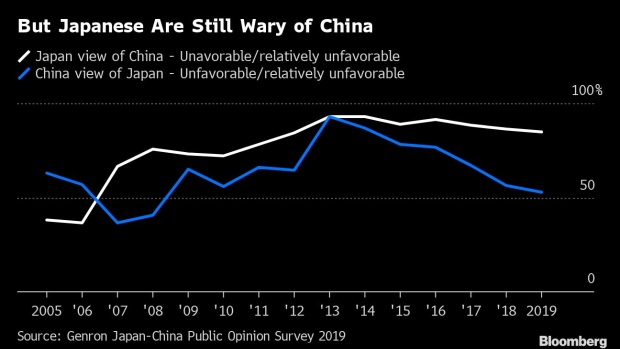Nov 22, 2019
Japan Needs to Do More to Fix China’s Image Problem, Xi Says
, Bloomberg News

(Bloomberg) -- In a statement that is likely to annoy some in Japan ahead of his visit planned for next spring, Chinese President Xi Jinping blamed the unpopularity of his country on Japanese bias and prejudice.
“The fact that Chinese people have a more favorable view of Japan shows that China is following the right path,” said Xi, speaking in Beijing in response to a question from former Japanese Foreign Minister Yoriko Kawaguchi. “We are not spreading antagonism against Japan, instead we are encouraging people to visit Japan.”
“As for the biased view of Japanese people toward China, yes, China needs to do some things but more importantly the responsibility is on the Japanese side. It needs to do more things to undo the prejudiced and biased views against China.”
Japan and China have been working to improve their relations after an old dispute over islands in the East China Sea flared again in 2012. That led to anti-Japanese demonstrations and government protests in China, and a freeze on high-level contacts for years. In a sign of thawing ties, China’s Premier Li Keqiang visited Japan last year, and Xi also attended the Group of 20 meeting in Osaka, with the two sides agreeing Xi would make a state visit in spring 2020.
Abe Hails China Ties, Raises Tough Issues as Xi Visits Japan
However, while Chinese opinions of Japan have improved since their nadir in 2012, the opposite is not the case, with little recovery in the distrust and unfavorable views Japanese hold toward their neighbor.
That opinion declined drastically after anti-Japanese riots in China in 2005, and worsened after the 2012 problems. That fall also coincides with the rise in wealth and power of China, which surpassed the size of Japan’s economy a decade or so ago. As it’s grown more powerful, China has boosted both military spending and its attempts to control the East and South China Seas.
That has increased the sense of concern in Japan, which is increasingly economically dependent on trade with a sometimes unfriendly China. In addition, as an ally of the U.S., it has come under pressure during the current dispute between China and the U.S. On the one hand it has agreed to effectively ban Huawei from Japan’s 5G network after U.S. pressure, but it is still in talks with China and other countries to create two different economic agreements.
Xi said on Friday that bilateral relations had been generally friendly throughout history, with “some short periods of unpleasant history,” likely referring to the period before and during World War II when Japan colonized and conquered Chinese territory.
“The unpleasant episodes have left a strong impression in the mind of Chinese people” but conflict would benefit no-one, Xi said, comparing the two nations to neighbors who cannot move away from each other.
Japanese Prime Minister Shinzo Abe will travel to China next month to meet his Chinese counterpart Li and South Korea’s President Moon Jae-in at the annual trilateral summit. As well as discussing the fraught ties with South Korea, he will surely be discussing the bilateral irritants in relations with China.
Xi made the comments at a meeting in Beijing with representatives of the New Economy Forum, which is being organized by Bloomberg Media Group, a division of Bloomberg LP, the parent company of Bloomberg News. Henry Kissinger, former U.S. Treasury Secretary Hank Paulson and others were also in attendance.
--With assistance from Erin Roman.
To contact Bloomberg News staff for this story: James Mayger in Beijing at jmayger@bloomberg.net;Lucille Liu in Beijing at xliu621@bloomberg.net
To contact the editors responsible for this story: Jeffrey Black at jblack25@bloomberg.net, James Mayger, Colin Keatinge
©2019 Bloomberg L.P.